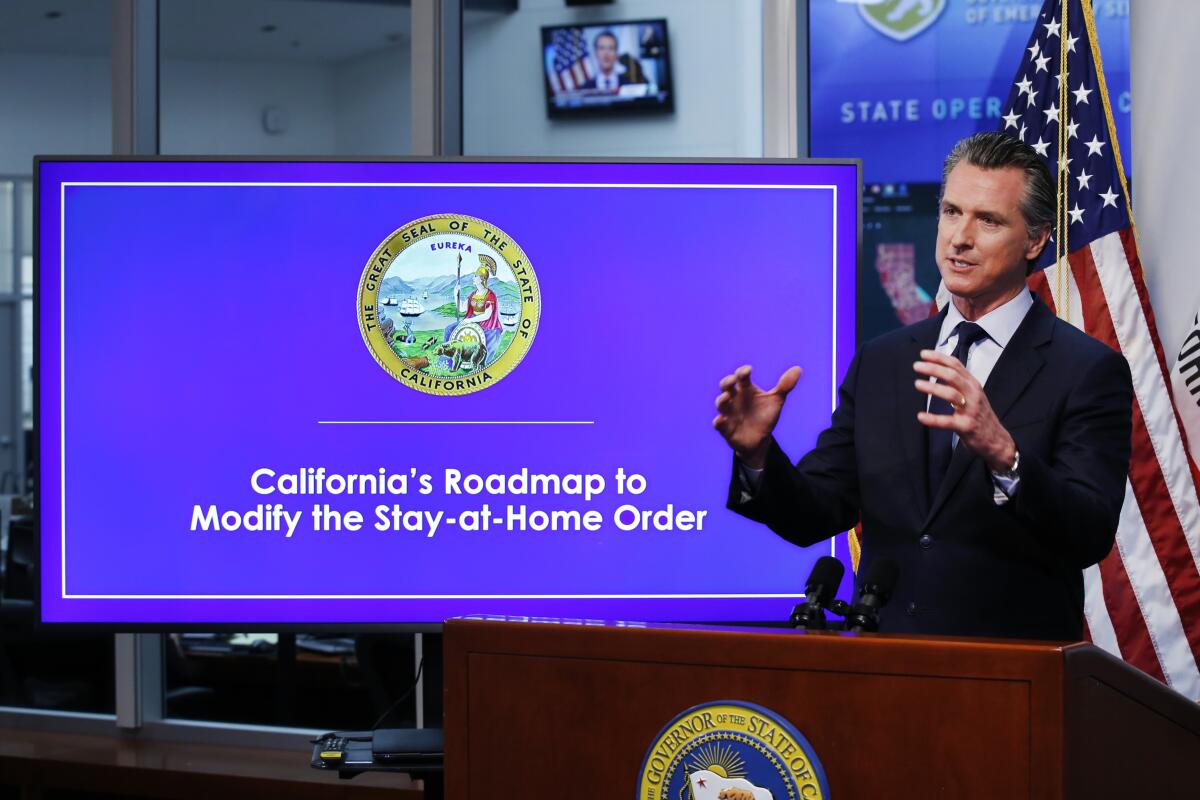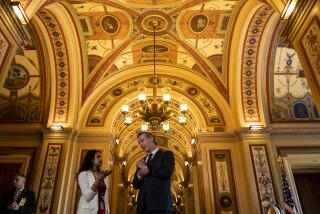Gov. Newsom rebuked by Sutter County court for use of executive power amid COVID-19 pandemic

- Share via
SACRAMENTO — A Northern California judge on Monday tentatively ruled that Gov. Gavin Newsom overstepped his authority when he issued an order in June requiring vote-by-mail ballots to be sent to the state’s 22 million registered voters.
Sutter County Superior Court Judge Sarah Heckman also issued an injunction barring the governor from taking executive action that “changes existing statutory law or makes new statutory law or legislative policy,” rebuking a governor who has relied heavily on executive orders to respond to the COVID-19 pandemic.
Heckman’s ruling determined that Newsom’s executive order to send out the vote-by-mail ballots, as well as enact other precautions to reduce the threat of spreading the virus during the elections process, violated the California Constitution because it created new law. Under the state’s constitutional separation of powers, only the Legislature has the power to create laws.
The ruling found that the Emergency Services Act, also referred to as CESA, gives the governor authority “to suspend certain statutes, not to amend any statutes or create new ones.”
Because the California Legislature subsequently voted to enact the same vote-by-mail policy that Newsom had enacted with his order, as well as other safeguards, the ruling will not affect the November election.
The governor’s office and the plaintiffs who filed the legal action will be given an opportunity to respond to the tentative decision before it becomes official. Newsom’s office is expected to appeal.
The Sutter County Superior Court ruling is not expected to have an impact on the state’s mandates for Californians to wear masks when out in public, or other pandemic-related statewide restrictions on activities and businesses.
The state public health officer, who reports to Newsom, has the authority under state law to combat a contagious, infectious or communicable disease by taking “measures as are necessary to ascertain the nature of the disease and prevent its spread,” according to the state health and safety code. That law is separate from the Emergency Services Act.
Since he declared a state of emergency in mid-March, Newsom has issued more than 50 executive orders involving the COVID-19 pandemic that address a range of issues including price gouging and halting evictions.
In October, Newsom defended the executive actions, saying he issued the order to mail ballots and enact safeguards for in-person voting because he wanted to ensure the election took place as safely as possible. He noted that state lawmakers agreed and later codified those safeguards into law.
“We did what we thought was appropriate certainly within the framework of the constitutional authority that is invested in this office, the executive branch,” Newsom said during a news conference.
The legal challenge was filed by two Republican state assemblymen, James Gallagher of Yuba City and Kevin Kiley of Rocklin, who are both attorneys and argued the case.
“This is a victory for separation of powers. The governor has continued to create and change state law without public input and without the deliberative process provided by the Legislature. Today the judicial branch again gave him the check that was needed and that the Constitution requires,” the two lawmakers said in a joint statement after the tentative ruling was released. “Nobody disputes that there are actions that should be taken to keep people safe during an emergency. But that doesn’t mean that we put our Constitution and free society on hold by centralizing all power in the hands of one man.”
Newsom spokesman Jesse Melgar said the administration is “evaluating next steps.”
“The tentative ruling makes clear that the governor’s statutory emergency authority is broad, and constitutional, and that the governor has the authority, necessary in emergencies, to suspend statutes and issue orders to protect Californians,” Melgar said in a statement released Monday afternoon. “Additionally, this ruling has absolutely no effect whatsoever on the current election. We strongly disagree with specific limitations the ruling places on the exercise of the governor’s emergency authority.”
Gallagher also said that the ruling would not affect voters in the Nov. 3 election.
“It doesn’t impact their ability to cast a vote in this election and it cast no doubts on this election,” he said.
Gallagher and Kiley asked the judge to bar the governor from issuing any future executive orders that “exercise legislative powers,” a request the judge granted.
“The evidence persuades the court it is reasonably probable the governor will continue issuing executive orders which amend statutory law and create legislative policy under the purported authority of the CESA, violating the California Constitution and the rights of plaintiffs thereunder and giving rise to a multiplicity of judicial proceedings, unless restrained by a permanent injunction,” Heckman stated in the ruling.
The tentative ruling upheld the constitutionality of the state Emergency Services Act, a 50-year-old state law that grants the governor widespread power to respond during a state of emergency such as a pandemic. In October, the Michigan Supreme Court ruled that Gov. Gretchen Whitmer lacked the authority to issue emergency orders under a similar law in that state.
During a hearing last month, California Deputy Atty. Gen. John Killeen argued that Newsom had the authority to issue the executive order requiring all voters to receive mail-in ballots under California’s Emergency Services Act.
The law grants the governor substantial authority during a state of emergency, including “complete authority over all agencies of the state government and the right to exercise within the area designated all police power vested in the state by the Constitution and laws of the state of California.”
The law also allows the governor to commandeer private property, redirect state funds and suspend any regulatory statutes, orders, rules or regulations that “would in any way prevent, hinder, or delay the mitigation of the effects of the emergency.”
“If the governor can suspend statutes but not direct what will happen next, then you have a vacuum,” Killeen argued during the hearing on the legal challenge in October. “Local officials would then be stuck just waiting, hoping that the Legislature would act eventually. Is that how an emergency should be addressed? Of course not. That’s why the Legislature vested all the police power of the state in the governor until the Legislature itself can act.”
During the hearing, Killeen also expressed concern about the possibility that a ruling could impinge on the governor’s executive authority.
Legal challenges to the governor’s authority under the Emergency Services Act have been rare over the last half-century, primarily because governors have used that authority to respond to regional disasters such as earthquakes, wildfires, drought and flooding.
But with the pandemic affecting the entire state and the daily lives of nearly 40 million Californians, it has remained a threat to public health since the outbreak hit in March. The spread of the virus is not expected to significantly subside until effective vaccinations and treatments are in place, likely well into 2021.
In defense of Newsom’s actions, Killeen relied in part on a 1995 California Supreme Court ruling that defined the scope of a governor’s authority during times of emergency. That case stemmed from former Gov. George Deukmejian’s 1989 executive order to begin aerial spraying of malathion in Los Angeles County because of an infestation of the crop-destroying Mediterranean fruit fly.
Killeen said the state Supreme Court ruling stated that “the governor’s emergency powers are without a doubt the single most compelling and absolute exercise of sovereign authority that the state acting through its chief executive may pursue. The Supreme Court specifically said that generally individuals cannot ‘second-guess’ and affirmatively interfere with the state’s decision as to how best to respond to the emergency.”
More to Read
Sign up for Essential California
The most important California stories and recommendations in your inbox every morning.
You may occasionally receive promotional content from the Los Angeles Times.














